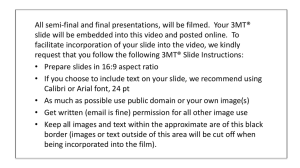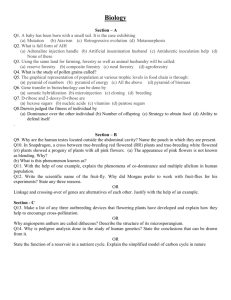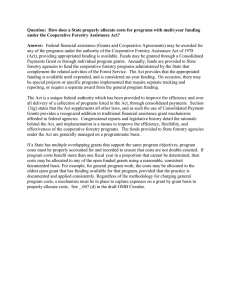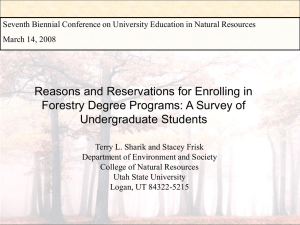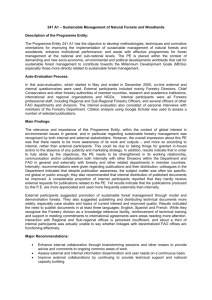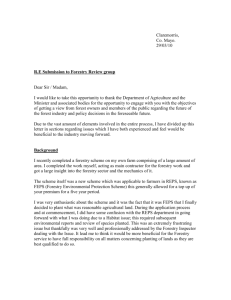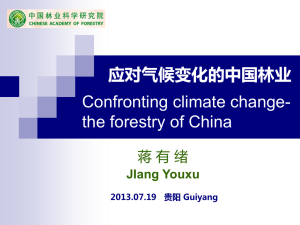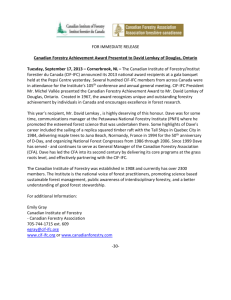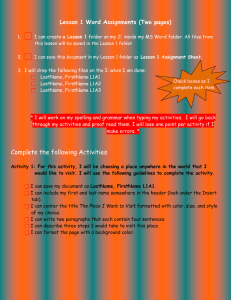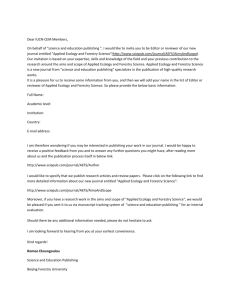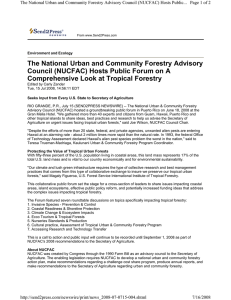Forestry An Internal Journal of Forest Research
advertisement
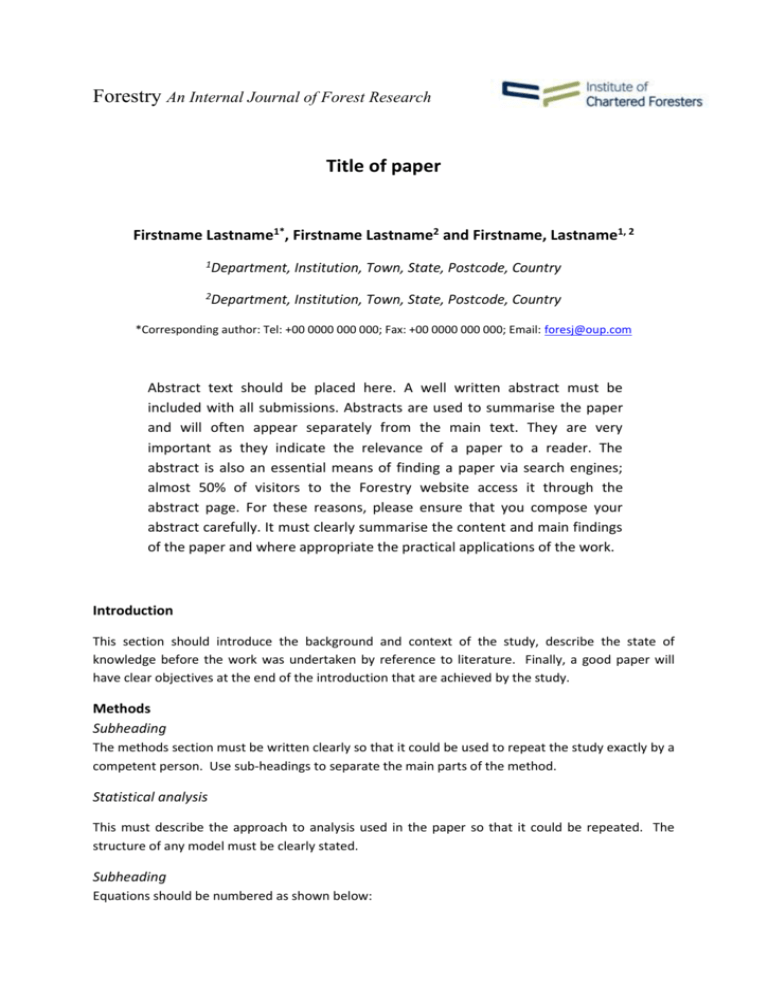
Forestry An Internal Journal of Forest Research Title of paper Firstname Lastname1*, Firstname Lastname2 and Firstname, Lastname1, 2 1Department, Institution, Town, State, Postcode, Country 2Department, Institution, Town, State, Postcode, Country *Corresponding author: Tel: +00 0000 000 000; Fax: +00 0000 000 000; Email: foresj@oup.com Abstract text should be placed here. A well written abstract must be included with all submissions. Abstracts are used to summarise the paper and will often appear separately from the main text. They are very important as they indicate the relevance of a paper to a reader. The abstract is also an essential means of finding a paper via search engines; almost 50% of visitors to the Forestry website access it through the abstract page. For these reasons, please ensure that you compose your abstract carefully. It must clearly summarise the content and main findings of the paper and where appropriate the practical applications of the work. Introduction This section should introduce the background and context of the study, describe the state of knowledge before the work was undertaken by reference to literature. Finally, a good paper will have clear objectives at the end of the introduction that are achieved by the study. Methods Subheading The methods section must be written clearly so that it could be used to repeat the study exactly by a competent person. Use sub-headings to separate the main parts of the method. Statistical analysis This must describe the approach to analysis used in the paper so that it could be repeated. The structure of any model must be clearly stated. Subheading Equations should be numbered as shown below: Type equation here. (1) Type equation here. (2) Results Describe the results of the study in a logical order in bite-sized pieces. First describe the general result and then if appropriate delve into the detail. Discussion This section is an opportunity to explain how the study has contributed to improved knowledge making reference to the literature. Any risks or uncertainties must be addressed. Conclusion Use short, crisp statements to describe the main conclusions of the work. What are the ‘take home’ messages from the study? Funding Details of all funding sources for the work in question should be given in a separate section entitled 'Funding'. The following rules should be followed: The sentence should begin: ‘This work was supported by …’ The full official funding agency name should be given, i.e. ‘National Institutes of Health’, not ‘NIH’ (full RIN-approved list of UK funding agencies) Grant numbers should be given in brackets as follows: ‘[grant number xxxx]’ Multiple grant numbers should be separated by a comma as follows: ‘[grant numbers xxxx, yyyy]’ Agencies should be separated by a semi-colon (plus ‘and’ before the last funding agency) Where individuals need to be specified for certain sources of funding the following text should be added after the relevant agency or grant number 'to [author initials]'. An example is given here: ‘This work was supported by the National Institutes of Health [AA123456 to C.S., BB765432 to M.H.]; and the Alcohol & Education Research Council [hfygr667789].’ Acknowledgements This is an opportunity to express thanks to people who have contributed to the study. Authors should note that editors and reviewers often appreciate an acknowledgement (even if this is ‘two anonymous reviewers’) in cases where they have put a lot of work into a paper. Conflict of interest statement Insert conflict of interest statement for all authors here, or use ‘None declared.’ References We recommend using Endnote to format references in journal style. The Forestry Endnote style can be downloaded from: http://endnote.com/styles/Forestry.ens. References of journals, books, multi-author books and articles published online should be cited in the text with the author name and date in parenthesis (Lastname, date), and the entries in the reference list should be listed alphabetically on last name and conform to the following examples: Allen, S.E., Grimshaw, H.M., Parkinson, J.A. and Quarmby, C. 1974 Chemical Analysis of Ecological Materials.2nd edn. Blackwell, Oxford, 596 pp Anonymous 2001 Woodlands for Wales. The National Assembly for Wales Strategy for Trees and Woodlands. Forestry Commission, Aberystwyth. Brazier, J.D. 1990 The timbers of farm woodland trees. Forestry Commission Bulletin No. 91. HMSO, London. Carleson, W.C. 1985 Seasonal variation in mitotic index in the stem apex of loblolly pine seedlings. In Proceedings of the International Symposium on Nursery Management Practices for the Southern Pines. D.B. South (ed.). School of Forestry, Auburn University, Alabama, pp. 303–310. CIFOR. 1999 The CIFOR Criteria and Indicators Generic Template. The Criteria and Indicators Toolbox Series No. 2.Center for International Forestry Research. Bogor, Indonesia, p. 53. FAO. 2003 State of the World’s Forests 2003. Rome, Italy. Lastname, A. 2012 Book Title. Edn. Publisher name, Location, 600pp. Lastname, A. and Lastname, B. 2012 Article title. Abbr. Journal Title 10, 100-150 Metropolitan Police. 2004 London Borough of Lambeth Crime and Disorder http://www.met.polic.uk/foi/pdfs/aims_objectives_plans/borough/lambeth_crime_and disorder_audit_2004.pdf (accessed on 20 June, 2006). Audit. Mulder, J.P.M. 1985 Simulation interception loss using standard meteorological data. In The Forest– Atmosphere Interaction. B.A. Hutchinson and B.B. Hicks (eds). Wiley, Chichester, pp. 177–196. Ståhl, G., Gove, J.H., Williams, M.S., Grimshaw, H.M., Parkinson, J.A, Malcolm, D.C.et al. 2005 Critical length sampling: a method to estimate the volume of down coarse woody debris. Eur. J. For. Res. (in press). Titus, B.D. Jr and Malcolm, D.C. 1992 Nutrient leaching from the litter layer after clearfelling of Sitka spruce. Can. J. For. Res. 65, 389–416. Table and Figure captions Figure 1 Figure caption including citation line if required (Reprinted with permission from XXX). Table 1.Table caption. Each figure and table must pass the ‘photocopy test’, i.e. if left on a photocopier a competent third person would quickly be able to interpret the data being displayed.
